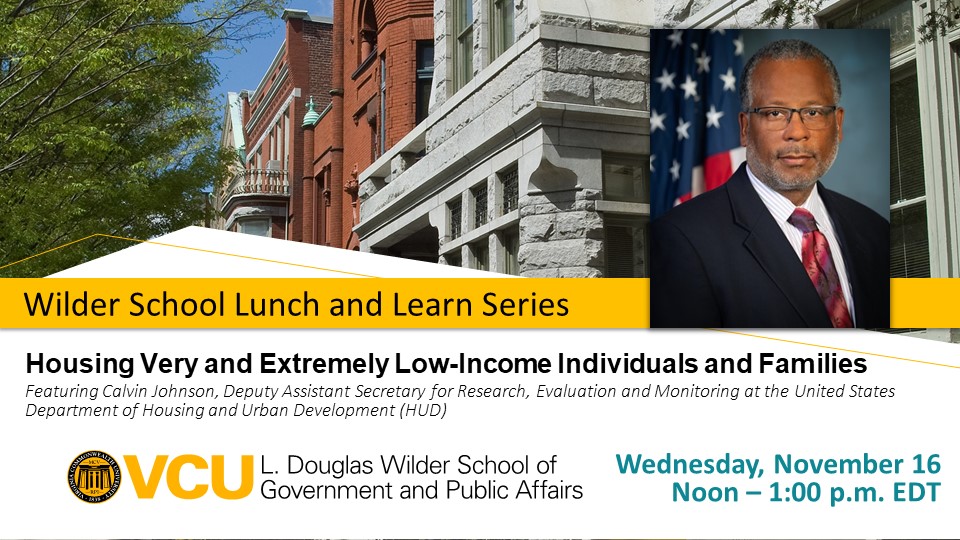News
Wilder School November Lunch and Learn: “Housing Very and Extremely Low-Income Individuals and Families”

Renter households are severely rent-burdened. The housing assistance safety net does not meet demand. Increases in the number and variety of homelessness is inevitable. In 2019, 7.7 million renter households experienced “worst-case housing needs.” These renter households do not receive housing assistance, have incomes at or below 50% of the Area Median Income, and are either paying more than 50% of their household income on rent or are living in severely inadequate housing or experiencing both of these problems. Ninety-five percent of households had worst-case housing needs only because of the severe rent burden.
In this presentation, Johnson will describe patterns of worst-case housing needs, share why HUD’s major rental assistance programs are a safety net for only a fraction of extremely — and very low-income renters, and highlight patterns of homelessness that are inextricably tied to worst-case housing needs and a lack of more extensive rental assistance program resources.
When: Wednesday, Nov. 16, Noon-1 p.m.
Where: Via Zoom; link emailed to registrants.
About the speaker:
Calvin C. Johnson, Ph.D., Deputy Assistant Secretary for Research, Evaluation and Monitoring, Office of Policy Development and Research (PD&R) at the U.S. Department of Housing and Urban Development (HUD)
Johnson serves as one of the principal advisors to HUD leadership on research, demonstration, and evaluation activities and oversees a broad evaluation portfolio to include projects exploring the impact of housing on non-housing outcomes – economic self-sufficiency, health and wellness, educational achievement, and public safety. His portfolio includes demonstrations, evaluations, and research on housing discrimination, homelessness, aging in place, disaster resilience/recovery, community planning and development, and building science and technology.
In 2021, he was appointed by Secretary Marcia Fudge (HUD) to serve on the Commission for the Social Status of Black Men and Boys, which is housed within the U.S. Commission on Civil Rights. Johnson is also a fellow of the National Academy of Public Administration where he serves as a member of the standing panel on social equity in governance – the panel responsible for leading the performance of the Academy’s social equity agenda as well as co-sponsoring the Academy’s Annual Social Equity Leadership Conference.
Johnson has served in research, evaluation, and policy positions at the Court Services and Offender Supervision Agency, The University of Pennsylvania, The Urban Institute, and with the Executive Office of the Mayor of the District of Columbia. Johnson is also a part-time Visiting Professor of Practice in the Masters of Public Administration program at Bowie State University. He is committed to increasing the pipeline of people of color pursuing careers in policy and program evaluation.
About the moderator:
Chelsie Dunn, MPH, Senior Research Associate, Research Institute for Social Equity
Dunn earned a bachelor's degree in psychology from Wesleyan College in 2011, a Master in Public Health degree in urban public health from Charles R. Drew University of Medicine & Science in 2013 and a Master in Arts degree in clinical psychology from Alliant International University in 2016. She joined the health psychology doctoral program at VCU in 2016.
Dunn’s research focuses on reducing sexual health disparities among Black adolescent girls and young women through the development of culturally responsive and effective intervention programs. Specifically, she is interested in the impact gendered racial microaggressions, self-conceptualization and sexual socialization have on Black adolescent girls' sexual risk and protective behaviors, outcomes and attitudes.
